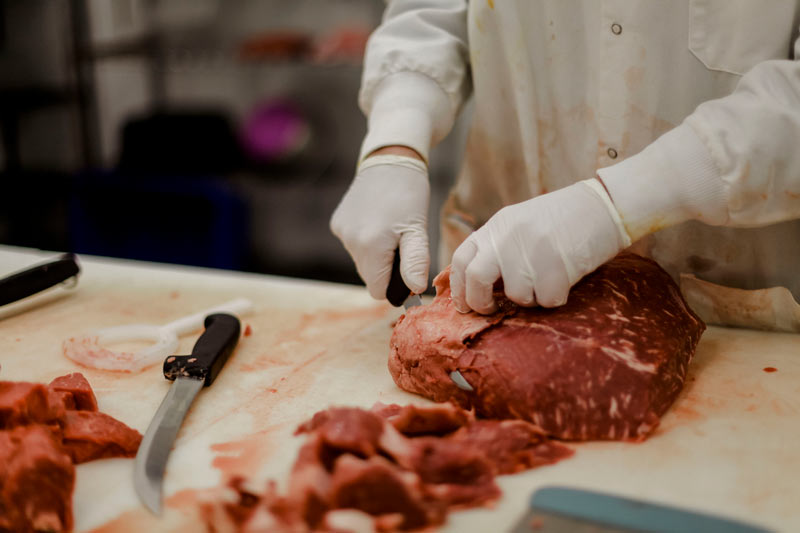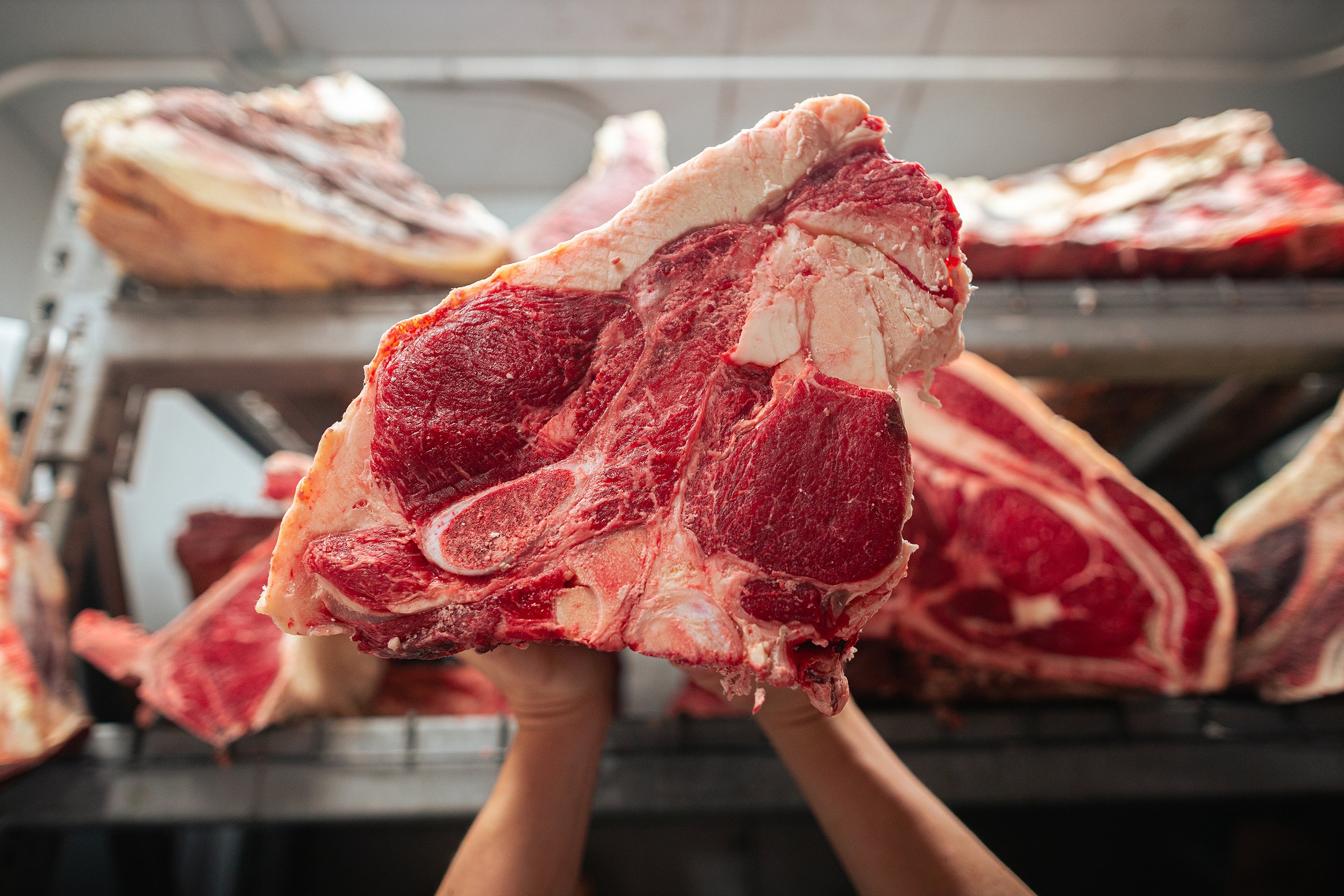An Insight into the customer experience at meat markets edwardsville il.
Everything About Meat Markets: Comprehending Their Duty in Supporting Local Farmers
Meat markets offer a crucial function in local economic situations by connecting the void between consumers and farmers. They use a straight sales network that boosts the freshness and high quality of meat products. Beyond ease, these markets play a significant role in advertising sustainable farming and supporting the incomes of neighborhood farmers. However, the ramifications of this partnership prolong additionally than one might expect, questioning about sourcing methods and customer choices.
The Relevance of Meat Markets in Neighborhood Economic Situations
Commonly ignored, meat markets play a vital function in bolstering regional economic situations by sustaining farmers and producing work. These establishments act as essential intermediaries, giving a system for local manufacturers to offer their products straight to consumers. By acquiring locally sourced meat, customers add to the sustainability of nearby ranches, ensuring their viability and promoting farming diversity.
In addition, meat markets produce work chances, varying from butchers and sales personnel to monitoring and logistics functions. This job production stimulates the neighborhood economic climate, cultivating a sense of area as residents involve with their area businesses.
On top of that, meat markets typically draw in consumers that look for top notch, fresh products, which can cause enhanced foot website traffic and sales for bordering services. Overall, the visibility of meat markets can considerably boost regional economic health, strengthening links between agriculture and area well-being while supporting the livelihoods of farmers.

Attaching Customers and farmers: Exactly how Meat Markets Run
Meat markets offer as essential hubs that link regional farmers directly with consumers, assisting in a structured supply chain that profits both celebrations. By sourcing items from close-by farms, these markets ensure that customers receive fresh, top quality meat while supporting local farming. The operation of meat markets involves developing connections with farmers, usually enabling them to showcase their products and share their farming techniques.
Subsequently, consumers get accessibility to a diverse selection of meats that show regional tastes and preferences. Transparency is an essential facet of these markets, as customers are usually given with details concerning the sourcing and taking care of of the meat. This straight connection cultivates depend on and loyalty between farmers and consumers, enhancing area ties. Additionally, meat markets regularly take part in promotional tasks, such as farm-to-table events, which better enhance the customer's experience and awareness of regional farming methods.
Promoting Lasting Farming Practices
Promoting lasting agriculture practices is important for the future of food manufacturing and environmental wellness. By concentrating on moral farming techniques, motivating biodiversity, and promoting for seasonal and regional sourcing, the agricultural market can considerably decrease its environmental impact. These methods not just sustain the environment but also promote a healthier partnership in between farmers and consumers.

Moral Farming Strategies
An expanding number of farmers are embracing honest farming methods to boost sustainability and minimize ecological influence. These approaches concentrate on accountable land management, reducing making use of chemical fertilizers and pesticides, and embracing organic practices. Methods such as crop rotation, cover cropping, and agroforestry not only improve soil health and wellness but also promote biodiversity. Additionally, farmers are increasingly focusing on pet well-being by lowering and supplying pasture-based systems confinement techniques. By focusing on neighborhood resources and community involvement, honest farming fosters a resilient farming system. This shift not only benefits the atmosphere but also strengthens the connection in between farmers and consumers, encouraging informed investing in choices that sustain lasting techniques. Inevitably, these methods offer to produce a much more lasting future for farming.

Biodiversity and Ecosystem Health
While many agricultural practices have traditionally focused on return over environmental equilibrium, an expanding recognition of biodiversity's relevance has emerged among consumers and farmers alike. Biodiversity improves environment durability, sustaining dirt health and wellness, parasite control, and pollination. By integrating diverse plants and livestock, farmers can develop a lot more steady ecosystems that lower dependence on chemical inputs and enhance total productivity. Sustainable farming practices that advertise biodiversity not only secure all-natural habitats but likewise add to the long-lasting viability of farming. Meat markets play a necessary function in this standard change by advocating for neighborhood items that prioritize environmental health. By selecting to source from farms that embrace biodiversity, consumers can support practices that guarantee a sustainable future for agriculture and the setting.
Seasonal and Regional Sourcing
Seasonal and neighborhood sourcing not just enhances the freshness of food however likewise sustains sustainable farming techniques that profit both consumers and farmers. By prioritizing neighborhood meat markets, customers can connect directly with farmers, promoting a feeling of community and trust. This model reduces the carbon impact connected with long-distance transportation, advertising environmental sustainability. Farmers take advantage of even more steady revenues and a trusted market for their items, which motivates liable farming techniques. Furthermore, seasonal sourcing motivates varied farming methods, permitting farmers to rotate plants and livestock, thus maintaining soil health and biodiversity. Generally, this approach produces a more resilient food system that lines up with the worths of neighborhood, quality, and sustainability support, reinforcing the crucial link between consumers and local agricultural systems.
The Duty of Openness in Sourcing Meat
What aspects add to customer count on in meat items? Transparency in sourcing is a vital component. Customers progressively read this inquire concerning where their meat originates from, consisting of the farms and practices entailed in elevating the animals. Meat markets that prioritize transparency commonly present clear labeling, detailing the resource and production methods made use of. This openness cultivates self-confidence and allows consumers to make educated selections.
In addition, transparent techniques can consist of farm gos to, partnerships with local farmers, and sharing tales about the pets and their atmospheres. As customers come to be more informed regarding food sourcing, they tend to prefer meat products from distributors that loom with information. This need for transparency not just enhances consumer trust yet likewise urges meat markets to develop ethical partnerships with local farmers. Eventually, transparency sustains a cycle of responsibility, benefiting both customers and producers in the meat sector.
Sustaining Pet Welfare With Resident Sourcing
Supporting pet welfare via local sourcing hinges on the fostering of honest farming practices. By prioritizing openness in sourcing, customers can make educated options that mirror their worths. In addition, community interaction campaigns foster a more powerful connection in between farmers and customers, improving the total commitment to gentle therapy of pets.
Moral Farming Practices
While customers progressively focus on ethical factors to consider in their food selections, local sourcing offers a practical course to supporting pet welfare. Ethical farming practices highlight gentle therapy of pets, ensuring they have adequate room, appropriate nourishment, and accessibility to exterior settings. Regional farms usually comply with these standards, as they are much more answerable to their areas and customers. By picking to source meat locally, consumers can support ranches that focus on lasting and humane techniques over industrialized approaches, which often compromise pet wellness. This link fosters a much deeper understanding of food production and urges responsible intake. Inevitably, regional sourcing encourages customers to make informed selections that align with their values concerning honest treatment of animals cheap online butchers in the food sector.
Openness in Sourcing
Exactly how can openness in sourcing boost customer depend on in local meat markets? By giving clear info about the beginnings of their items, local meat markets foster a sense of liability and honesty. When consumers recognize the sourcing techniques, consisting of the treatment of animals and farming approaches, they are most likely to feel great in their buying choices. This transparency allows consumers to align their values with the companies they sustain, recognizing they are contributing to ethical pet well-being and sustainable techniques. In addition, local meat markets can display collaborations with close-by farms, stressing community assistance and enhancing my review here a positive connection between consumers and manufacturers. Inevitably, openness in sourcing not just constructs trust but additionally urges enlightened choices amongst consumers.
Area Interaction Initiatives
What role do area engagement initiatives play in promoting pet welfare with neighborhood sourcing? These initiatives significantly enhance awareness and understanding of ethical farming methods among customers. By promoting connections in between local farmers and neighborhood participants, meat markets can emphasize the relevance of gentle treatment of animals. Educational workshops and ranch scenic tours permit customers to witness firsthand the conditions under which pets are elevated, strengthening the worth of regional sourcing. Additionally, area events, such as farm-to-table suppers, highlight the partnership between pet welfare and sustainable methods. Through these involvements, customers create count on local meat markets, motivating them to support honest fostering a culture and sourcing of liable intake that prioritizes animal well-being in the area.
Health Perks of Choosing Resident Meat Products
Choosing neighborhood meat items offers countless health and wellness advantages that can significantly boost general well-being (edwardsville meat market). One considerable benefit is the lowered time between farm and table, which often results in fresher meat with higher dietary value. Neighborhood meats often tend to be devoid of unsafe preservatives and ingredients commonly located in factory-farmed options, contributing to a cleaner diet
Additionally, neighborhood farmers typically focus on humane and lasting methods, resulting in healthier animals that generate better-quality meat. Grass-fed and pasture-raised animals, often found in regional markets, typically have greater levels of omega-3 fats and reduced degrees of hydrogenated fats compared to their barnyard counterparts.
Moreover, sustaining neighborhood meat items promotes community health by guaranteeing that customers have accessibility to secure and responsibly sourced food. By selecting neighborhood, individuals not only nurture themselves yet additionally contribute to the wellness of their neighborhood and environment.
Making Educated Options at the Meat Market
When going across a meat market, recognizing the crucial elements that affect high quality and sourcing can equip customers to make enlightened choices. Buyers need to focus on regional items, which commonly originate from farms with sustainable techniques. Identifying labels such as "grass-fed" or "organic" can additionally guide decisions, as these commonly indicate higher well-being criteria and nutritional advantages.
Engaging with the butcher is necessary; knowledgeable staff can supply insights right into the sourcing of their meats and suggest cuts that suit different cooking approaches. Consumers are encouraged to inquire regarding the farm's practices, consisting of pet treatment and feed.
Additionally, analyzing the meat's color and texture can reveal quality and high quality. Lean cuts need to show up brilliant and wet, while fatty cuts need to have a marbled appearance. By integrating these practices, consumers can confidently pick meats that line up with their worths and support neighborhood farming.
Often Asked Inquiries
What Kinds of Meat Are Most Typically Sold at Neighborhood Meat Markets?
Regional meat markets commonly offer a selection of meats, including beef, hen, pork, and lamb. These facilities often include specialized cuts, sausages, and in your area sourced items, satisfying diverse cooking preferences and customer demands.
Just How Can I Find a Meat Market Near My Area?
To locate a meat market close by, one can use on the internet maps, internet search engine, or local directories - bagley meat market edwardsville il. In addition, asking neighbors or close friends for suggestions frequently generates important insights right into the finest neighborhood options readily available
Exist Seasonal Variations in Meat Availability at Meat Markets?
Seasonal variations in meat availability at meat markets often happen, influenced by factors such as local farming methods, pet breeding cycles, and seasonal need. This can affect the types and quantities of meat used throughout the year.
Do Meat Markets Offer Unique Promos or Discount Rates for Bulk Purchases?
Meat markets often provide unique promotions and discounts for bulk purchases. This method motivates customers to get bigger amounts while enabling the markets to manage stock efficiently, profiting both consumers and business monetarily.
Can I Ask For Details Cuts of Meat at the Market?
Yes, consumers can frequently request particular cuts of meat at the marketplace. Numerous butchers are ready to fit special orders, ensuring that clients get the specific cuts they desire, tailored to their preferences.
By sourcing products from neighboring farms, these markets ensure that consumers get fresh, top notch meat while supporting regional agriculture. By prioritizing local meat markets, consumers can attach directly with farmers, fostering a feeling of neighborhood and trust. Just how can transparency in sourcing enhance customer count on in neighborhood meat markets? Neighborhood meat markets normally use a variety of meats, including beef, chicken, pork, and lamb. Seasonal variants in meat schedule at meat markets commonly happen, affected by elements such as neighborhood farming techniques, pet breeding cycles, and seasonal demand.